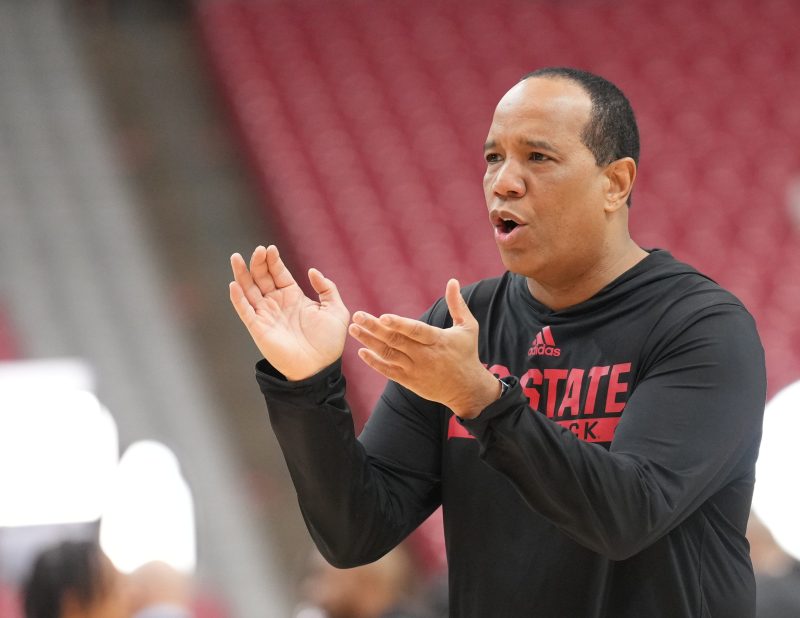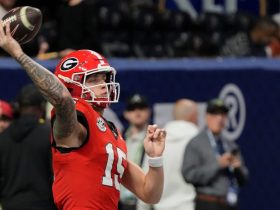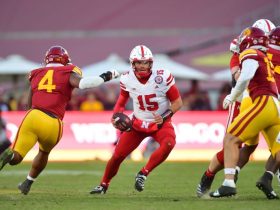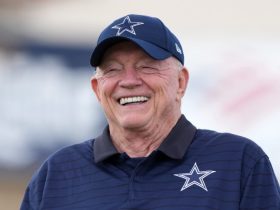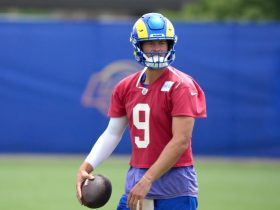GLENDALE, Ariz. — During recruiting season, they’d all come to see Kevin Keatts because he was the guy with the players. One by one, the biggest names in college basketball would stop by Hargrave Military Academy, the boarding school in middle-of-nowhere Southern Virginia, trying to recruit the players Keatts had brought there.
He was an important cog in the machine of American basketball; the guy responsible for helping college-bound players who needed prep school to improve their grades or their recruiting stock or those who just wanted a better level of competition. And because of that, all the hotshot, multi-millionaire coaches didn’t just know him, they needed him – even if the general public had no idea who he was.
Keatts, a native of Lynchburg, Va., was fine with that. His parents were 45 minutes away. Life was steady. He thought he might even be the next Fletcher Artist, who coached at Fork Union Military Academy for 46 years and sent dozens of players to college and the NBA.
“I was content not taking another job,” said Keatts, who won 94% of his games at Hargrave and coached a handful of future NBA players. “I had no intent on getting into college. And then, you know, fortunately I got a call and it changed everything.”
The call came from Rick Pitino in 2011, asking Keatts to consider joining his coaching staff at Louisville.
FOLLOW THE MADNESS: NCAA basketball bracket, scores, schedules, teams and more.
“The rest becomes history,” he said.
In a historical sense, Keatts’ rise from high school coach to Final Four coach in the span of a dozen seasons is highly unusual. In this Final Four, though, it actually seems like the norm.
For much of the time Keatts was at Hargrave Military Academy, UConn’s Dan Hurley was “driving a minibus” around New Jersey to get his St. Benedict’s Prep team to games while Alabama’s Nate Oats was teaching math and coaching at Romulus High School near Detroit.
For all three to end up on the biggest stage in college basketball is a story of serendipity and opportunity — but also one that shows the next great coaching career could start anywhere.
‘I’m just a high school guy that caught a break that’s still trying to prove that I belong at this level,” Oats said.
For Oats that break was, ironically enough, meeting the Hurley family.
At Romulus, Oates coached a player named E.C. Matthews, who went on to become an all-Atlantic 10 player at Rhode Island. He was recruited there by Dan Hurley and his older brother Bobby, the former Duke and NBA star whose visits to Romulus sparked a deeper relationship.
‘He was running a college program in high school, just like my dad,” said Dan Hurley, whose father Bob Sr., built one of the sport’s legendary high school programs at St. Anthony’s in Jersey City. “The thing I noticed was like, this guy’s wired different. Different level of energy about him. I went and watched them in the (state) tournament. One of the most detailed video scouts that you’ll see. In the back, they had spaghetti cooking on the stove. You could see he was a high-level guy that just happened to be coaching in (high school).”
At various points in his time at Romulus, the possibility of career advancement had motivated Oats, whose only experience in college had been a few years as an assistant at the Division I level. “I think I would have taken any Division I assistant job anywhere in the country,” he said.
But his big break never came to fruition. Oats interviewed for a couple assistant jobs in the Mid-American Conference, but nothing ever came through. A bit of frustration set in. After getting to know the Hurleys, he came to grips with the idea that he could still make his mark in the sport even if he remained a high school coach forever.
“We were winning,” Oats said. “Good retirement plan as a schoolteacher. If Bob Hurley, Sr., can be a Hall of Fame coach, multiple Division I head coaching job that he turned down, I could stay here and be a very successful basketball coach and be happy with it.”
But when Bobby Hurley got the head coaching job at Buffalo in 2013, he asked Oats to come with him. Oats didn’t want to uproot his family and take a job if there was a significant risk of getting fired, but he figured hitching his wagon to one of the Hurley brothers was pretty safe.
Two years later, when Bobby Hurley left for Arizona State, it only took then-Buffalo athletics director Danny White about a day to promote Oats and suddenly make him a Division I head coach. Four years later, he’s at Alabama contending almost right away for SEC championships.
“I think it gives some hope and belief for just the normal high school coach out there,” Oats said. “I know I’m fortunate. I worked for different people, caught different breaks that a lot of people don’t get. There’s a lot of high school coaches that are just as good if not better than me but just haven’t had a break that I’ve been able to have.”
If Oats’ lack of college pedigree prevented him from landing on the radar, Dan Hurley’s career prospects were being limited by a different factor: He might have been too picky.
Throughout his time at St. Benedict’s, Hurley had opportunities to join college coaching staffs. He had the name and the connections to top players, particularly in the talent-rich state of New Jersey.
Hurley had turned down a chance to go to Pittsburgh as an assistant and Marist as a head coach, not wanting to move his family for just any job. He wanted to eventually coach in college, but it had to be the right place. And as the son of a coach who stayed at one school forever, it wasn’t natural for him to be a constant climber.
In 2010, Wagner met the criteria. He spent two years there, six at Rhode Island and now six at UConn. If he wins a second consecutive national title, he’ll have gone from prep school to a lock for the Hall of Fame in almost record time.
“Some of the best coaches in the world are high school guys,” Keatts said. “They’re doing the same thing we’re doing, but they’re not making a lot of money to do it. They do it for the love of the game, and I think that’s what is so special about it.”
When Keatts arrived at Louisville, it obviously opened his eyes to see how a legend like Pitino ran his program day-to-day. But he also discovered that he had his own “cheat sheet” that gave him an edge on other assistants.
After sending 10 or 11 kids a year from Hargrave to Division I schools, he knew the good and bad from nearly every program and how every college coach formed their sales pitch. That taught him a lot about recruiting — what to do, what not to do and how those relationships manifest once players arrive on campus.
“I wouldn’t (give up) that experience for anything,” Keatts said. “It was a great foundation to help me grow to where I’m at today.”

